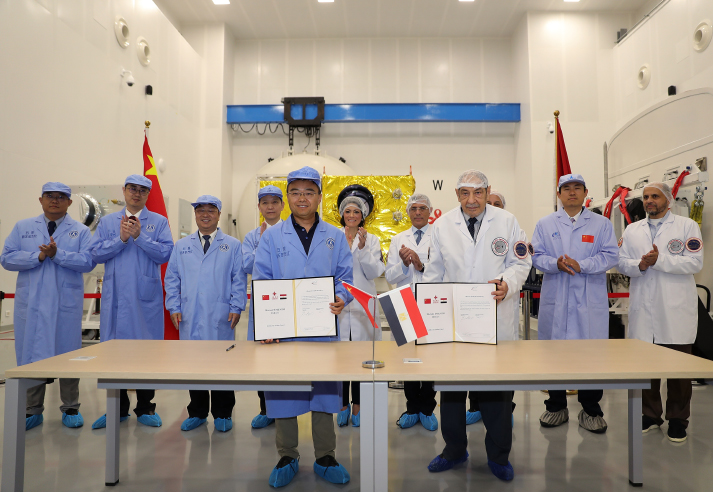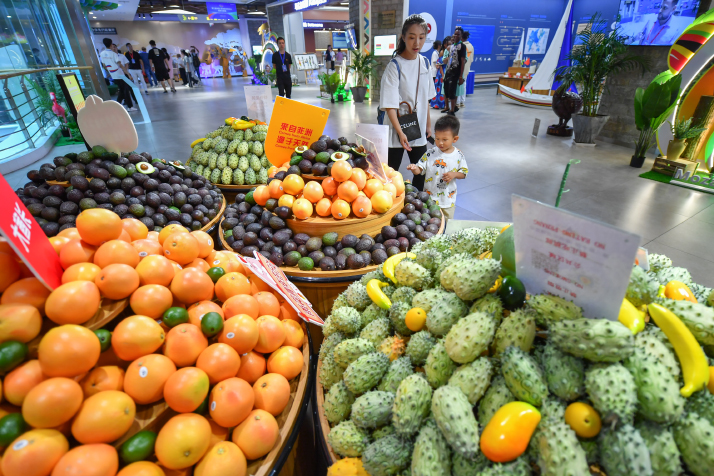| Voice |
| Safeguarding our global village | |
|
|
 A ceremony marking the delivery of two prototype satellites as part of the China-funded MisrSat II project at the Egyptian Space Agency near New Administrative Capital, Egypt, on June 25. With China's help, Egypt has become the first African country with the capacity to assemble, integrate and test satellites (XINHUA)
Until recently, the world was fast becoming an interconnected global village. The Cold War was becoming a distant memory, and the East-West divide was becoming less about ideology and more about geography. But then came the COVID-19 pandemic and the Russia-Ukraine conflict. In the blink of an eye, the old divisions began to resurface. Great strides have been made toward connecting the global architecture to focus on greater coordination between development and security for the benefit of humanity, as opposed to the benefit of individual nations, which is often skewed in favor of the developed world. But within the emerging multipolar world, development and security cooperation needs to adapt. The role of multilateralism in achieving such coordination should not be underestimated, neither should initiatives such as the Global Development Initiative (GDI) and the Global Security Initiative (GSI). Development goals The GDI was put forward at the United Nations by Chinese President Xi Jinping in September 2021. When addressing the General Debate of the 76th Session of the UN General Assembly, Xi outlined the initiative in his speech titled Bolstering Confidence and Jointly Overcoming Difficulties to Build a Better World. It is intended to support the UN's Sustainable Development Goals, which envisage a "global development partnership" to promote a "stronger, greener and healthier" world. Since then, 32 practical measures for cooperation have been identified, and more than 100 countries and international organizations have indicated their support, 68 of which have joined the Group of Friends of the GDI at the UN. Going forward, the GDI will have several main focuses. First, it will remain committed to development as a priority, and focus on the implementation of the UN 2030 Agenda for Sustainable Development. It will also remain committed to results-oriented actions and a project-led approach in promoting policy dialogue, experience sharing, capacity building and practical cooperation. Second, the GDI will encourage extensive participation, with the UN as an important partner for cooperation and with the Group of Friends of the GDI as the main driver. It will increase efforts to pool resources, encourage donor participation in cooperative projects, and better leverage the China-initiated Global Development and South-South Cooperation Fund and the UN Peace and Development Trust Fund. Lastly, and perhaps most urgently, it will focus on addressing the pressing key issues of poverty alleviation, food and energy security, and overcoming the disruption to industrial and supply chains. In a nutshell, the GDI provides renewed impetus to the implementation of the UN 2030 Agenda for Sustainable Development by revitalizing partnerships for global development, mobilizing international development resources, deepening development cooperation, bridging the North-South gap, and aiming for stronger, greener, and healthier global development.  Fruits from Africa on display during the China-Africa Economic and Trade Expo in Changsha, Hunan Province, on July 1(XINHUA)
Addressing security challenges Also proposed by President Xi, at the Annual Conference of the Boao Forum for Asia in April 2022, the GSI calls on countries to adjust to the changing international environment in the spirit of solidarity. It proposes that the world's complex and intertwined security challenges be addressed with a win-win mindset. The GSI pinpoints an exhaustive list of priorities for cooperation, including actively participating in the formulation of a new agenda for peace, as well as the other initiatives listed in the UN's Our Common Agenda. It will also help coordinate healthier interactions among major countries in order to build peaceful coexistence, overall stability and balanced development. Upholding the consensus that a nuclear war cannot be won and must never be fought, and seeing to the full implementation of the resolution titled Promoting International Cooperation on Peaceful Uses in the Context of International Security, which was adopted by the 76th Session of the UN General Assembly, will be a weighty priority. So too will encouraging the political settlement of international and regional disputes, while respecting the sovereignty and territorial integrity of all countries. In addition, the GSI will focus on shoring up the maritime dialogue and practical cooperation to reduce maritime differences, and to work together to tackle transnational crimes at sea. The GSI also backs the World Health Organization in its work on global public health, and in coordinating and mobilizing global resources to jointly respond to global infectious diseases. Safeguarding global food and energy security is also a primary concern. The GSI will see to the effective implementation of the UN Convention Against Transnational Organized Crime and support the cooperation among countries in addressing climate change. The GSI proposes a number of platforms and mechanisms to carry out these hefty objectives. These include engaging in wide-ranging discussions within all organs of the UN, leveraging the roles of the Shanghai Cooperation Organization, BRICS, the Conference on Interaction and Confidence Building Measures in Asia, and other relevant mechanisms, and holding of high-level conferences on global security. It also undertakes to reinforce international peace and security forums, such as the China-Africa Peace and Security Forum, the Middle East Security Forum, the Beijing Xiangshan Forum and the Global Public Security Cooperation Forum. And, with a view to improving the world's collective governance capacity in the domain of non-traditional security, it suggests the creation of more international platforms and mechanisms for exchange and cooperation on tackling security challenges in such areas as counter-terrorism, cybersecurity, biosecurity and emerging technologies. The world has changed as a result of the COVID-19 pandemic and the Russia-Ukraine conflict, and new trend is emerging. This negative trajectory must be countered in the interest of economic and human development. Dialogues must be synchronized, structured and aligned with the UN goals. The author is chief executive officer of the Inclusive Society Institute in South Africa. This article first appeared in ChinAfrica magazine and is an edited excerpt from a paper presented at the 12th Meeting of the China-Africa Think Tanks Forum in May Copyedited by G.P. Wilson Comments to yanwei@cicgamericas.com |
|
||||||||||||||||||||||||||||||
|